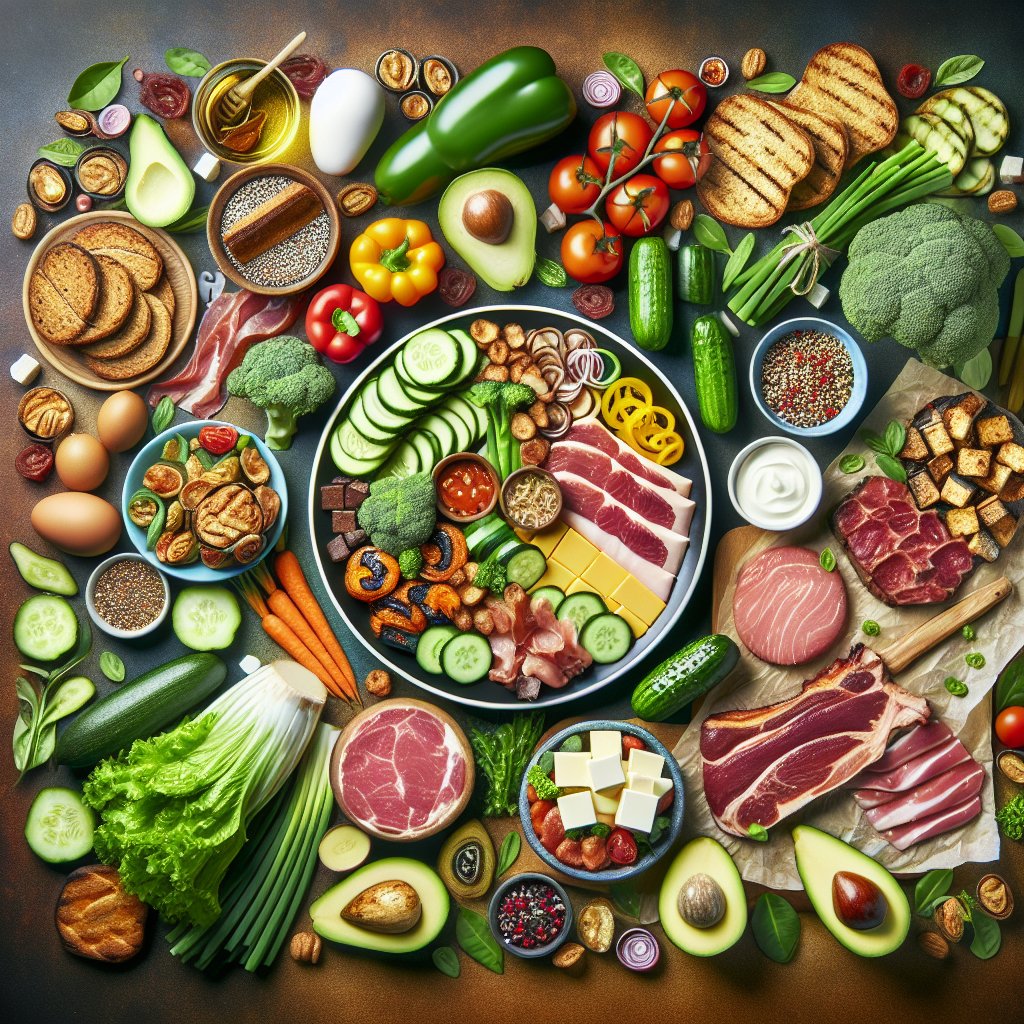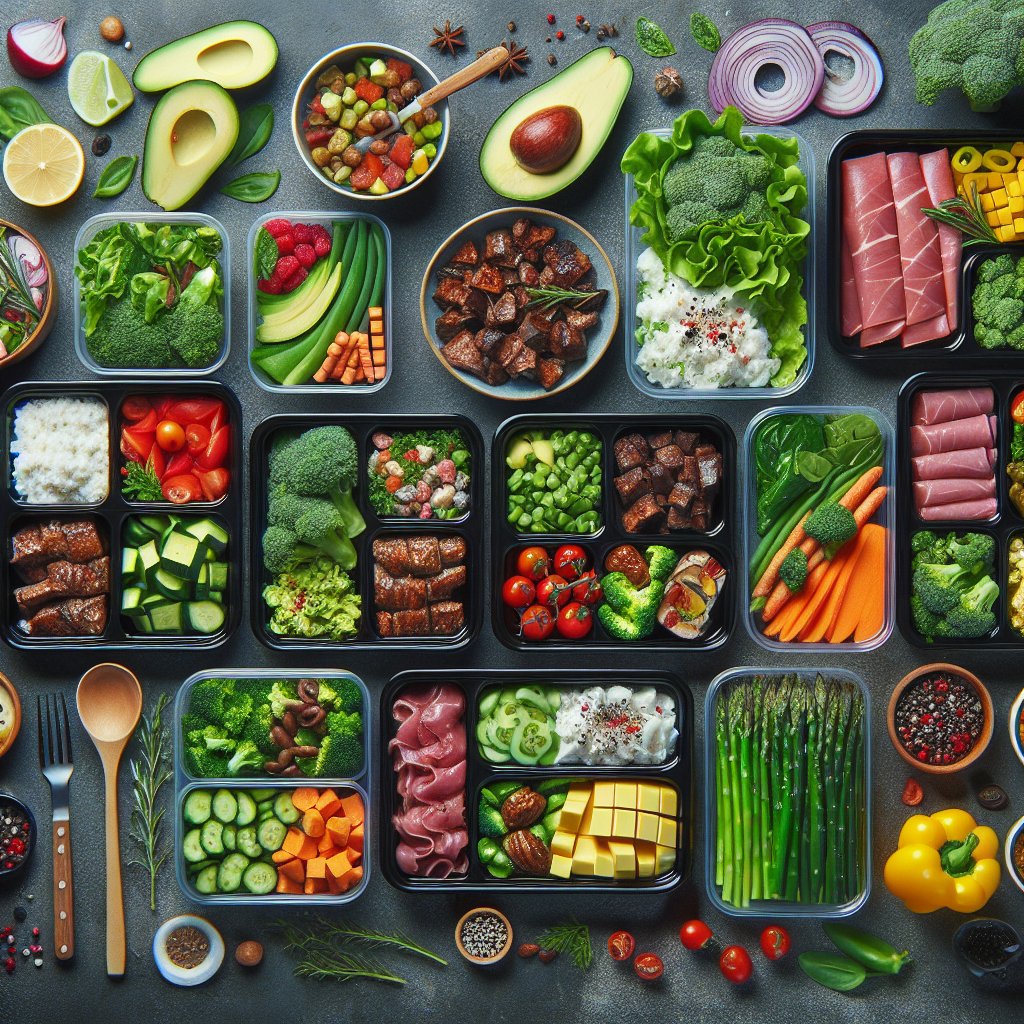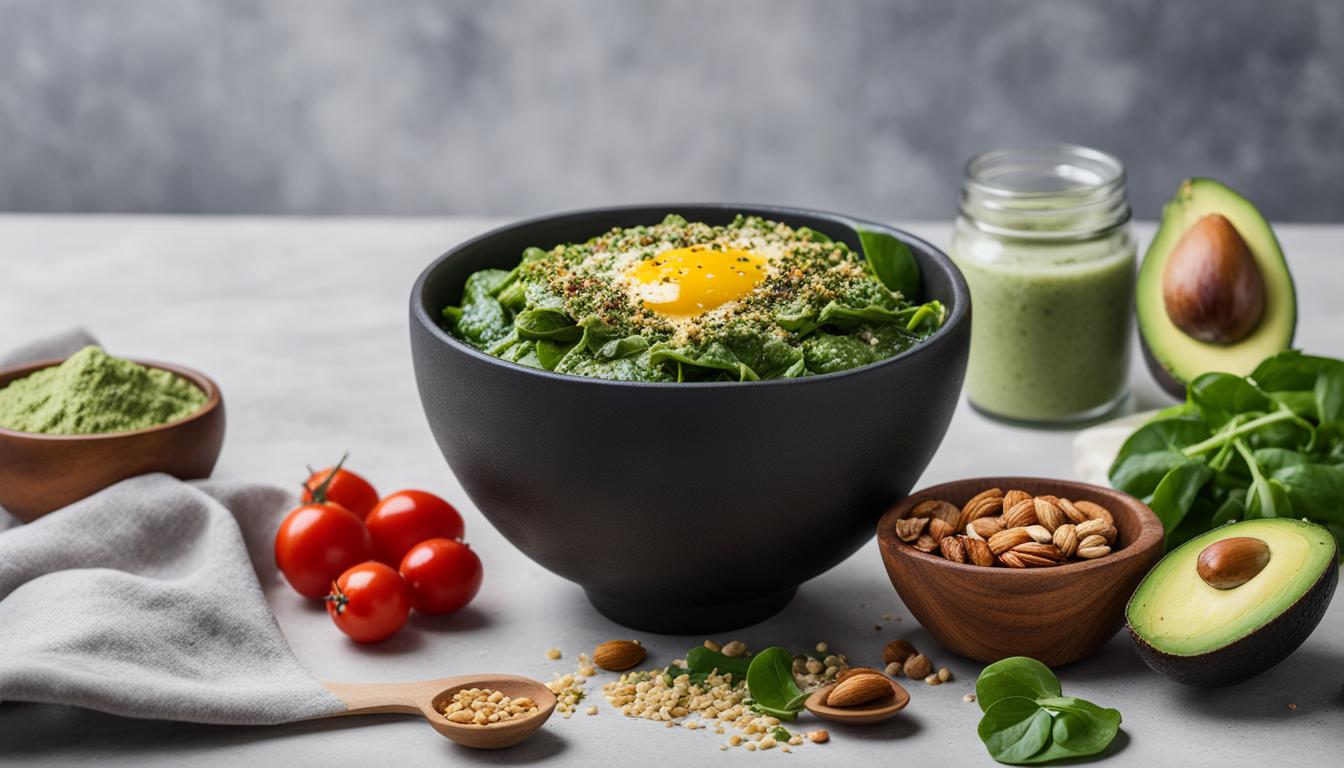Unlocking the Secrets: What is in a Keto Diet Plan? Discover the Benefits, Foods, and Insider Tips for Success!
Brief Overview of a Keto Diet Plan
Have you heard about the ketogenic diet, also known as the keto diet? It’s been making waves in the health and wellness community for its remarkable benefits. But what exactly is a keto diet plan, and why is it gaining so much popularity?
Well, a keto diet plan is a high-fat, low-carbohydrate eating approach. The primary goal is to induce a metabolic state called ketosis, where the body primarily burns fat for fuel instead of glucose from carbohydrates. This shift in metabolism can lead to various health benefits, including weight loss, improved energy levels, and mental clarity.
The increasing popularity of the keto diet plan can be attributed to its effectiveness in promoting weight loss and improving overall well-being. Furthermore, numerous studies have shown that the keto diet can have positive effects on conditions such as type 2 diabetes, metabolic syndrome, and neurological disorders.
As more people seek natural and sustainable ways to manage their health, the keto diet plan has emerged as a compelling option. Its potential to transform the body’s energy utilization and promote a sense of vitality has captivated the interest of health enthusiasts and researchers alike.

Benefits of a Keto Diet Plan
So, you’ve heard about the keto diet, but are you aware of the numerous health benefits it offers? Let’s dive into some of the amazing advantages of following a keto diet plan.
Weight Loss and Management
Research has shown that a keto diet plan can be highly effective for weight loss and weight management. When you follow a low-carb, high-fat diet, your body enters a state of ketosis, where it becomes incredibly efficient at burning fat for energy. In fact, a study published in the International Journal of Environmental Research and Public Health found that individuals following a ketogenic diet experienced significant weight loss over a 12-week period.
Improved Heart Health
Believe it or not, a keto diet plan may also benefit your heart. By reducing carb intake and increasing healthy fats, you can positively impact important cardiovascular markers. According to research from the American Journal of Clinical Nutrition, a ketogenic diet has been linked to improved levels of HDL cholesterol (the “good” cholesterol), lower blood sugar and insulin levels, and a reduction in blood pressure.
Enhanced Mental Focus and Clarity
Ever feel like you’re in a midday fog, struggling to concentrate? Ketones, which your body produces during ketosis, are not just great for burning fat; they also provide a fantastic source of fuel for your brain. A study in the Journal of Child Neurology discovered that children with epilepsy who followed a keto diet plan experienced improved cognitive functioning and greater mental clarity.
Increased Energy Levels
One of the most common benefits reported by those following a keto diet plan is a surge in energy. When your body becomes fat-adapted and proficient at utilizing fat for fuel, you may find yourself feeling more physically and mentally energized. Plus, the steady supply of fuel from fats can help prevent the energy crashes often associated with high-carb diets.
Better Blood Sugar Control
For individuals with type 2 diabetes or those at risk of developing the condition, a keto diet plan may help in managing and controlling blood sugar levels. A study published in Diabetes Therapy revealed that participants following a ketogenic diet experienced significant improvements in HbA1c levels and a reduction in the use of diabetes medication.
These are just a few of the many health benefits that come with adopting a keto diet plan! The evidence is clear—this way of eating can truly transform your health and well-being.
Detailed List of Foods Allowed on a Keto Diet Plan
So, you’ve decided to embark on a keto diet journey – a fantastic choice for those seeking to enjoy healthy weight management and numerous health benefits! An integral part of a successful keto diet plan is understanding the foods you can enjoy without sabotaging your goals.
Low-Carb Vegetables
First up, let’s talk about the abundance of low-carb vegetables that are not only allowed but encouraged on a keto diet. These include nutrient-dense options like spinach, kale, cauliflower, broccoli, zucchini, and asparagus. These vegetables are excellent sources of vitamins, minerals, and fiber, while also being low in net carbs, making them perfect for a keto lifestyle.
Healthy Fats
Healthy fats are the cornerstone of the keto diet. Avocados, coconut oil, olive oil, and high-quality grass-fed butter are all superstar choices. They provide essential fatty acids and are perfect for cooking and dressing salads, giving your body the necessary fuel for ketosis.
Protein Powerhouses
When it comes to protein, prioritize consuming pasture-raised eggs, fatty fish such as salmon and mackerel, and grass-fed meat like beef and lamb. These choices offer high-quality protein and important nutrients like omega-3 fatty acids, aiding in muscle repair and overall health.
Nuts and Seeds
Nuts and seeds are delicious and versatile components of a keto diet plan. Opt for almonds, chia seeds, flaxseeds, and walnuts, which are rich in healthy fats and fiber. However, it’s essential to be mindful of portion sizes as the carb content can add up quickly.
Dairy Delights
Full-fat dairy products such as cheese, heavy cream, and Greek yogurt are excellent sources of fat and protein. They can be enjoyed in moderation on a keto diet. Just ensure they are as unprocessed and natural as possible to reap the most benefits.
Berries in Moderation
While fruits are generally limited on a keto diet due to their natural sugar content, some berries like strawberries, blueberries, and raspberries can be included in small portions. They are lower in carbs compared to other fruits and provide essential vitamins and antioxidants.
By focusing on these food groups, you can create a diverse and delicious keto meal plan that keeps you feeling satisfied and energized while working towards your health and wellness goals.
Next up, let’s delve into the myriad benefits that come with following a well-structured keto diet plan.

List of Foods to Avoid on a Keto Diet
When following a ketogenic diet, it’s important to be mindful of the foods you should restrict or avoid to stay in a state of ketosis. While it may seem challenging at first, there are plenty of delicious alternatives that will keep you on track while still enjoying flavorful meals. Here’s a rundown of the foods to be cautious of on a keto diet plan:
1. Sugary Foods and Sweets
Avoiding sugary foods and sweets is essential on a keto diet. Research has shown that high sugar intake can significantly impact ketone production and decrease the body’s ability to burn fat as a fuel source. Steer clear of items like candy, cakes, pastries, and ice cream to stay in ketosis.
2. Grains and Starches
Grains and starches are carb-rich foods that can quickly kick you out of ketosis. Studies have found that reducing grain and starch intake helps to lower blood sugar and insulin levels. This means saying no to foods like wheat, rice, pasta, and bread for better success with your keto diet plan.
3. High-Carb Fruits
While fruits are an important part of a balanced diet, some are too high in sugar and carbs for keto. Based on scientific data, fruits such as bananas, mangoes, and grapes should be limited or avoided due to their high carbohydrate content, which can interfere with ketosis.
4. Processed Foods and Trans Fats
Processed foods and trans fats have been linked to various health issues, and they have no place in a ketogenic diet plan. According to research, these foods can elevate inflammation and hinder the body’s ability to utilize fat for energy. Be on the lookout for items like fast food, hydrogenated oils, and highly processed snacks.
By being mindful of these food categories and opting for nutrient-dense, low-carb alternatives, you can optimize your keto diet plan for success, making it easier and more enjoyable to stick to your health goals.
Meal Planning on a Keto Diet
Tips and Strategies for Effectively Planning Meals on a Keto Diet
Hey there, fellow keto enthusiast! Let’s talk about one of the key ingredients to success on the keto diet – meal planning. Planning your meals is a game-changer that can make your keto journey smoother, tastier, and more satisfying. So, let’s dive into some practical tips and strategies for effectively planning meals on a keto diet.
Understanding What is in a Keto Diet Plan
Before we jump into the nitty-gritty of meal planning, it’s important to understand what a keto diet plan consists of. A keto diet is a low-carb, high-fat diet that offers various health benefits. The primary aim is to get your body into a metabolic state called ketosis, where it begins to burn fat for fuel instead of carbs. This means that your meals should mainly consist of healthy fats, moderate amounts of protein, and a minimal intake of carbohydrates.
Plan Your Meals Around Protein and Vegetables
When planning your keto meals, make protein and non-starchy vegetables the stars of your plate. Incorporate a variety of grass-fed meat, poultry, seafood, and eggs for your protein sources, and load up on leafy greens, broccoli, cauliflower, zucchini, and bell peppers for your vegetable intake. This ensures that you’re getting essential nutrients while keeping the carb count low.
Embrace Healthy Fats
Don’t shy away from healthy fats! Avocado, coconut oil, olive oil, nuts, and seeds are fantastic sources of healthy fats that can be incorporated into your meals. They not only add delicious flavors and textures but also keep you feeling fuller for longer, making it easier to stick to your keto plan.
Keep It Simple and Prep Ahead
Simplicity is key when it comes to keto meal planning. Keep your recipes uncomplicated, especially if you have a hectic schedule. Consider batch cooking and meal prepping on the weekends to have keto-friendly meals ready to go during the busy weekdays. This not only saves time but also prevents impulsive, carb-laden food choices.
Experiment with Keto-Friendly Recipes
One of the best parts of the keto diet is the opportunity to explore and experiment with new recipes. Look for keto-friendly versions of your favorite dishes, use different herbs and spices to add flavor, and get creative with alternative ingredients. This not only keeps your meals interesting but also helps you stay on track with your keto goals.
Incorporating these tips and strategies into your meal planning routine can help you stay on track and make the most of the amazing benefits that a keto diet has to offer. Bon appétit and happy keto cooking!

Unlocking the Secrets: What is in a Keto Diet Plan? Discover the Benefits, Foods, and Insider Tips for Success!
Possible Side Effects of a Keto Diet
Starting a keto diet can bring about a range of changes in your body. Some individuals may experience common side effects as their bodies adapt to this new way of eating. It’s important to be aware of these potential side effects and how to manage them effectively.
One of the most common side effects experienced by individuals starting a keto diet is the “keto flu.” This temporary condition can lead to symptoms such as headache, fatigue, dizziness, irritability, and difficulty focusing. Research by Dr. Ethan Weiss and his colleagues at the University of California, San Francisco, suggests that the keto flu is a result of the body transitioning from using glucose as its primary fuel source to using ketones. However, rest assured that these symptoms are often short-lived, typically lasting from a few days to a couple of weeks.
Additionally, some people may encounter digestive issues like constipation or diarrhea when they first begin a keto diet. This can be attributed to the significant dietary changes, especially the reduction in carbohydrates and the increase in fat consumption. Introducing more fiber-rich low-carb vegetables and staying well-hydrated can be helpful in alleviating these symptoms.
In the initial stages of a keto diet, you might also experience changes in your sleep patterns. While this can be disconcerting, it’s important to remember that these disruptions are often temporary. Research by Dr. Masino and Dr. Ruskin at Trinity College in Hartford suggests that these sleep disturbances could potentially be linked to the body’s adjustment to using ketones as fuel.
It’s crucial to remember that while these side effects can be challenging, they are typically transient and often subside as your body adapts to the keto diet. However, if you’re concerned about any symptoms, it’s always best to consult with a healthcare professional to ensure a safe and positive transition to your new eating plan.
Importance of Hydration on a Keto Diet
Staying hydrated is crucial for overall health and well-being, but it becomes even more important when you’re following a keto diet. Let’s delve into the significance of hydration on a keto diet and why it’s a key component of what is in a keto diet plan.
When you’re on a keto diet, your body enters a metabolic state called ketosis, where it burns fat for fuel instead of carbohydrates. As a result, your body releases stored water along with the breakdown of glycogen. This initial diuretic effect can lead to increased urination, causing a loss of essential electrolytes like sodium, potassium, and magnesium, which are vital for proper bodily function.
Studies have shown that dehydration can hinder athletic performance, cognitive function, and mood. Therefore, it’s crucial to maintain proper hydration levels while on a keto diet to avoid these potential side effects. Research published in the American Journal of Clinical Nutrition suggests that adequate hydration can also support weight loss and metabolic health.
Tips for Staying Hydrated on a Keto Diet
So, how can you ensure you stay hydrated while following a keto diet? Firstly, aim to drink at least 8-10 glasses of water per day. Additionally, consider increasing your electrolyte intake by consuming foods rich in potassium, magnesium, and sodium, such as leafy greens, avocados, and bone broth. You can also supplement with electrolyte powders or tablets to support hydration.
Incorporating herbal teas and consuming water-rich foods like cucumbers and berries can also contribute to your daily fluid intake. Overall, prioritizing hydration as part of your keto diet plan can help you feel your best and thrive on your wellness journey.

Supplements for a Keto Diet
While a well-planned ketogenic diet can fulfill most of your nutritional needs, there are instances where supplements can be beneficial in supporting the body’s adaptation to this low-carb, high-fat lifestyle.
Electrolytes
When you start a keto diet, your body sheds excess water along with essential minerals like sodium, potassium, and magnesium. This can lead to an imbalance in your electrolytes, causing symptoms like fatigue, muscle cramps, and headaches. Supplementing with electrolytes can help alleviate these issues. Research published in the Journal of the American College of Cardiology highlights that maintaining proper electrolyte balance is crucial for overall health, particularly during dietary changes.
MCT Oil
MCT (medium-chain triglyceride) oil is a type of fat that is rapidly converted into ketones, making it a popular supplement for those following a keto diet. A study in the European Journal of Clinical Nutrition suggests that MCT oil can increase ketone production and aid in weight management during a ketogenic program, making it a valuable addition to your daily routine.
Omega-3 Fatty Acids
While a ketogenic diet is naturally high in fat, it’s essential to ensure a balance between omega-3 and omega-6 fatty acids. Omega-3s, found in fatty fish and certain seeds, have anti-inflammatory properties, which is especially beneficial as keto diets are known to reduce inflammation. Research published in the journal Nutrients emphasizes the importance of maintaining a proper omega-3 to omega-6 ratio for optimal health while on a ketogenic diet.
Exogenous Ketones
Exogenous ketones are supplemental ketones that can help elevate your blood ketone levels, particularly during the early stages of ketosis. A review in the Frontiers in Physiology suggests that exogenous ketones can enhance athletic performance and mental clarity, making them an attractive option for individuals navigating the initial phases of a keto diet.
Before adding any supplements to your regimen, it’s advisable to consult with a healthcare professional, especially if you have any underlying health conditions or are taking medication.
The Role of Exercise in Conjunction with a Keto Diet Plan
When it comes to a keto diet plan, the role of exercise is pivotal in maximizing the benefits and achieving overall wellness. Scientific research has shown that combining exercise with a ketogenic diet can significantly enhance weight loss, improve cardiovascular health, and boost overall metabolic function.
Engaging in regular physical activity while following a ketogenic diet can promote greater fat loss and muscle preservation. This is because exercise helps to deplete glycogen stores, allowing the body to transition faster into a state of ketosis. Furthermore, the synergistic effect of exercise and the keto diet can lead to improved insulin sensitivity, which is beneficial for individuals with type 2 diabetes or insulin resistance.
Studies have also demonstrated that engaging in both resistance and aerobic training while on a keto diet plan can support muscle retention and enhance physical performance. This can be especially advantageous for individuals looking to maintain muscle mass while reducing body fat percentage.
Practical Tips for Exercise on a Keto Diet Plan
It’s important to note that while exercise is beneficial for enhancing the effects of a keto diet plan, it’s essential to listen to your body and make adjustments as needed. Some individuals may experience an adjustment period when starting a keto diet, so it’s advisable to gradually incorporate exercise and make modifications based on personal energy levels and performance.
Additionally, staying well-hydrated and ensuring an adequate intake of electrolytes is crucial when combining exercise with a keto diet. Electrolyte imbalance can occur due to the diuretic effect of ketosis, and replenishing these essential minerals is vital for maintaining proper muscle function and overall well-being during physical activity.
In conclusion, integrating exercise into a keto diet plan can yield numerous benefits and is highly recommended for overall health and well-being. However, it’s important to approach exercise with mindfulness and make adjustments as needed to ensure that it complements the dietary protocol optimally.
Practical Advice for Success on a Keto Diet
Following a keto diet plan can be a rewarding experience, but it definitely comes with its challenges. Here are some practical tips and suggestions to help you successfully navigate this lifestyle:
Plan Your Meals
Meal planning is pivotal for a successful keto journey. Prepare your meals and snacks in advance to avoid impulsive food choices, especially when you’re hungry. Stock up on keto-friendly ingredients such as lean meats, fish, low-carb vegetables, and healthy fats like avocados and nuts. This will make it easier to stick to your dietary goals.
Stay Hydrated
Hydration is crucial on a keto diet. When your body enters ketosis, it tends to release more water, which can lead to dehydration if you’re not careful. Aim to drink at least 8-10 glasses of water a day, and consider adding electrolytes to your water to maintain the body’s mineral balance.
Track Your Macros
Understanding and tracking your macronutrient intake is essential for reaching and maintaining ketosis. Use a food diary or a mobile app to keep track of your carbs, protein, and fat intake. This will help you make informed decisions about food choices and ensure you’re staying within your daily carb limits.
Seek Support
Find a supportive community or network, either online or offline, that shares your enthusiasm for the keto lifestyle. Having a support system can make a huge difference in staying motivated and accountable. It’s incredibly beneficial to share experiences, swap recipes, and seek advice from those who understand the journey.
By incorporating these practical tips into your daily routine, you’ll be well-equipped to achieve success on your keto diet plan.
Conclusion
After delving deep into the world of keto, it’s clear that a keto diet plan offers an array of benefits for both weight loss and overall health. The scientific research conducted on the ketogenic diet emphasizes its effectiveness in achieving weight loss and promoting wellness.
Key Points
Key research findings highlight the following benefits of a keto diet plan:
-
Weight Loss: Numerous studies have shown that a keto diet plan can lead to significant weight loss. The high fat, low carb, and moderate protein intake in a keto diet can help the body enter a state of ketosis, where it becomes efficient at burning fat for energy. This can lead to rapid and sustainable weight loss, making it an effective option for individuals looking to shed excess pounds.
-
Improved Health Markers: Research indicates that a keto diet plan can positively impact various health markers. It has been associated with improved blood sugar levels, reduced inflammation, and lower risk factors for heart disease. Additionally, some studies suggest that a ketogenic diet may have neuroprotective and anti-cancer effects.
-
Enhanced Mental Clarity: Many individuals following a keto diet plan report experiencing improved focus and mental clarity. This cognitive enhancement is attributed to the stabilization of blood sugar levels and the consistent supply of energy to the brain through ketone bodies.
Effectiveness of a Keto Diet Plan
The evidence from scientific research and countless success stories showcases the effectiveness of a keto diet plan. By following a well-structured keto diet, individuals have not only achieved weight loss but have also experienced positive changes in their overall health and well-being. The versatility and deliciousness of keto-friendly foods make this diet plan sustainable and enjoyable for many, further contributing to its effectiveness in achieving long-term success.
In conclusion, a well-formulated keto diet plan can be a powerful tool for anyone looking to transform their body and health. It is essential to approach any diet plan with mindfulness and a focus on nutrient-dense, whole foods. With careful planning and dedication, a keto diet plan can unlock a world of benefits, paving the way for a healthier and more vibrant life. So, are you ready to unlock the secrets to a fulfilling keto lifestyle?


